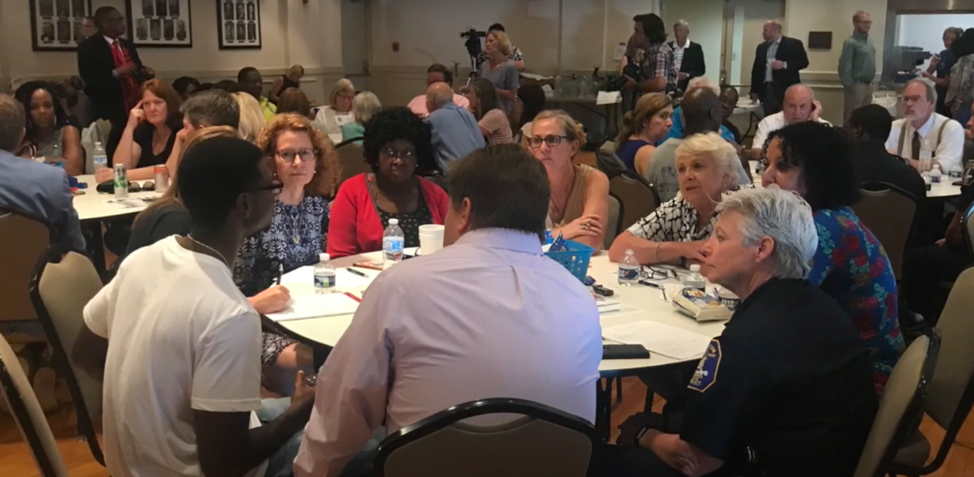COVID Defense Counsel Featured Jurisdictions July 16, 2020
As New Orleans’ criminal legal system has risen to the challenge of the Coronavirus, we’ve brought resilience lessons we learned during Hurricane Katrina to bear:
Knowing Where People Are
After the storm, thousands of people went without legal representation for months because we simply couldn’t track people. There were two tourists from Ohio, for example, who had been arrested on public order offenses and spent more than a month in jail.
This time around, we have a case management system, and our office is funded, albeit still so poorly that we are being forced to furlough some attorneys. But we have been able to immediately track people and start litigating to help the most vulnerable. It’s a huge difference from the ad-hoc tracking system we were using in 2005.

Seizing the Moment To Reduce Our Jail Population
Our pre-Covid jail population was 1,052, and we’ve since reduced it to 799—a level not seen in New Orleans since the 1970s, although if we were incarcerating people at the international rate, we’d have just 137 people in our jail, so there is still a long way to go for our criminal legal system reform efforts.
Thanks to our tracking system we’ve been able to prioritize getting the most vulnerable people out of jail. Initially, we tried using immediate release orders, which we had developed after Katrina and which were common practice whenever a storm was coming. Since we weren’t facing a hurricane, we had to show why this crisis warranted emergency releases. But we could litigate straight away.
Building Coalitions and Constituency For Reform
When you have audacious goals for criminal legal system reform, three things get in your way: resources, processes, and values. Values are the most difficult to change.
New Orleans has been the recipient of more than $3.5 million in funding from the Safety and Justice Challenge since 2015, with the goal of reducing the city’s jail population, and we were already making good incremental progress.
There’s no doubt that the COVID-19 crisis has spurred that huge further reduction in our jail population, but it’s the coalitions and relationships we’ve been building for some time that were instrumental in helping us spring into action, this time around.
A big lesson we learned after Katrina was that if you look alone, then folks with the power to do something will readily ignore you, whereas if you have constituency, then your chances for success go up exponentially.
Some of the criminal reforms that came out of Katrina had been thought of as too ambitious before. And I’d encourage reformers to view bold future reforms in a similar light, now, in the era of Coronavirus, including bond reform and bail reform. Our user-pay justice system is folding in this crisis, and it’s time to make changes.
“It’ll never last.”
I have a vivid memory of a judge taking me aside after Katrina and telling me the reforms we’d made would never last. That judge is gone, now, and we’re still here, along with many of our reforms. The point is that the changes we are making to the justice system today have the potential to become permanent.
Before Katrina, for example, our office wasn’t even publicly funded. Meanwhile, we’ve learned how to tackle both the short-term emergencies while strategizing and working together to aim for the longer-term reforms we want to see.
It’s important to be clear about what we want to see happen, and also to be clear that there are some things, in an emergency, that we’ll tolerate. But we’re also being very clear that once we get past it, things need to change.
Drawing The Line
After Katrina, it was very important for the defense bar to draw a line and assert our independence. There was one example where a defense attorney upset a judge and was hauled out of a courtroom in handcuffs. It sparked controversy, but a line was drawn, and we’ve held that ground since then.
We hold on to these reforms by proving that the reforms work and create value for our community and system. It’s also important to engage with media and others to tell the story of success.
I also remind people that whatever the reform, the empire always strikes back. There’s this reflexive systemic desire to reclaim what is lost. We’ve got to remain vigilant and be ready to defend the positive changes we’re able to make as a result of addressing this crisis.
—Derwyn Bunton is the Chief District Defender for Orleans Parish, in New Orleans, where he leads the Orleans Public Defenders Office. You can watch Mr. Bunton’s appearance as part of an April 10 webinar hosted by the American Bar Association, about lessons learned from Hurricane Katrina, by clicking here.


